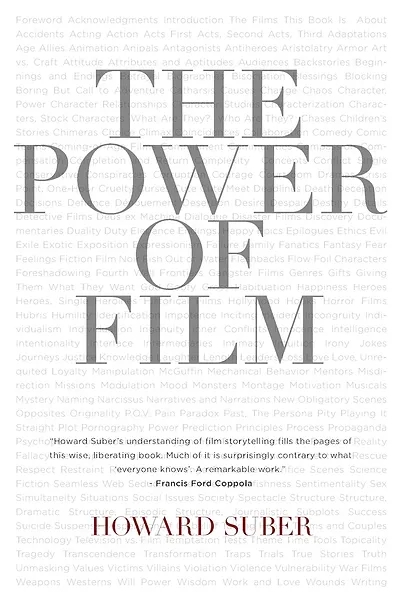Turner Classic Movies (TCM) is premiering an all-new original documentary series, The Power of Film, which explores some of the most popular and memorable American films of all time. New episodes of the six-part series will premiere every Thursday beginning January 4 at 8pm ET. Hosted and curated by renowned UCLA professor emeritus, founding chair of UCLA’s Film and Television Producers Program, and one of the founders of the UCLA Film Archive, Howard Suber, each 40-minute episode dives deep into the art of storytelling by examining the defining principles and inner workings of beloved films.

Executive produced by Doug Pray (Netflix’s hit series Arnold, HBO’s Grammy-winning, 5x Emmy-nominated series The Defiant Ones) and Laura Gabbert (IFC/Hulu’s City of Gold, Greenwich Entertainment’s Food and Country), and based on Suber’s book of the same title, The Power of Filmgoes far beyond an online masterclass by intertwining his structured framework, teachings and insights with dozens of dramatic movie scenes to create a uniquely engaging narrative through humor, emotion and human experience.
Suber’s impact on the entertainment industry and deep understanding of cinema have inspired countless careers throughout his 53 years of teaching. His efforts resulted in the Dickson Emeritus Professorship Award, the highest honor bestowed upon a retired faculty member. Having an extensive history of analyzing films and television, Suber has uncovered the mysteries surrounding what makes a film not only popular, but also memorable across generations. Suber is a man steeped in American film. His delivery is slow as if he has so much data in his brain he struggles to synthesize and simplify it but he does his best as clips of numerous films flash by. It is as if we are in a PHD 101 film class. Suber delivers in an easy format and tone imparting his insights on film and “arms you” with a theoretical intellectual framework to analyze films. While you may not agree with his ideology of film surely you will agree with some of it or at least understand his point of view. The content is far from simplistic and to glean full benefit of each episode multiple views are recommended.
Part of the fun is watching the continual stream of film clips. You may jump up and remark that you have seen this and that film and this is an effective mechanism to pair Suber’s comments with or like me you may have not seen or understood all the films but Suber is there to the rescue. Even if you determine Suber is a bit too complicated for you the endless film clips are well worth “the price of admission”!
The Power of Film is directed by Laura Gabbert, written by Howard Suber and Doug Pray, who also serves as supervising editor. Pray and Gabbert previously studied under and worked closely with Suber at the UCLA School of Film, Theater, and Television where they received their MFA.
Bear in mind the series exclusively focuses on American big studio productions with barely an acknowledgement to international and indee cinema quite like the programming of TCM the repetitive epicentre of big studio production. How many times a month must we watch “Rebel Without a Cause” or “Cat on a Hot Tin Roof” on TCM?
Episode 4 “Heroes and Villains” (25January2024 at 20:00 ET)
There are enough film clips of great American films here you can bask in them and “get your money’s worth” without listening to Suber’s commentary. Suber offers his insight which given his credentials is worth listening to but that does not translate into you having to agree with it. Suber attempts to offer us a Coles Notes categorization of heroes and villains in American cinema and many interesting points are made.
Suber answers the question of why people keep returning to certain movies and it just may be that we want to see a just and equitable world. Somewhat like seeing a world we want it to be.
Suber remarks that both villains and heroes can be killers but the villain kills for pleasure and self aggrandizement whilst a hero kills on behalf of society of doing something for a higher purpose. Villains are often more interesting than heroes being unpredictable but heroes can be boring. Villains love chaos and heroes order.
Episode 5 “The Power of the Paradox” (1February2024 at 20:00 ET)
Suber’s view is that one main attraction to a film is the situation where things are not what they appear to be. A paradox is defined as any person or thing/situation exhibiting an apparently contradictory nature but in reality exposes a possible truth and is more effective when combined with mystery e.g. Marlon Brando as Colonel Kurtz in “Apocalypse Now”:
Paradox has you asking for more. Colonel Kurtz was the dream soldier with impeccable credentials and experience yet he was demonic. Paradox draws viewers in as it is based on the reality of life. Dualities of character or not always contradictory as they can exist simultaneously. Predictable characters are boring. Betrayal can be the key for a successful film.
Episode 6 “Love and Meaning” (8February2024 20:00 ET)
In the last episode perhaps the most important theme in American film is love and Suber comes at the viewer with a wealth of film clips, semantics and psychology. Love is more than romance according to Suber as it includes mentorship, work, obsession, love triangles, war, the conflict between the concept of desire and duty and love and comedy. Desire is crucial to many films balancing the desire of the characters and that of the audience.

